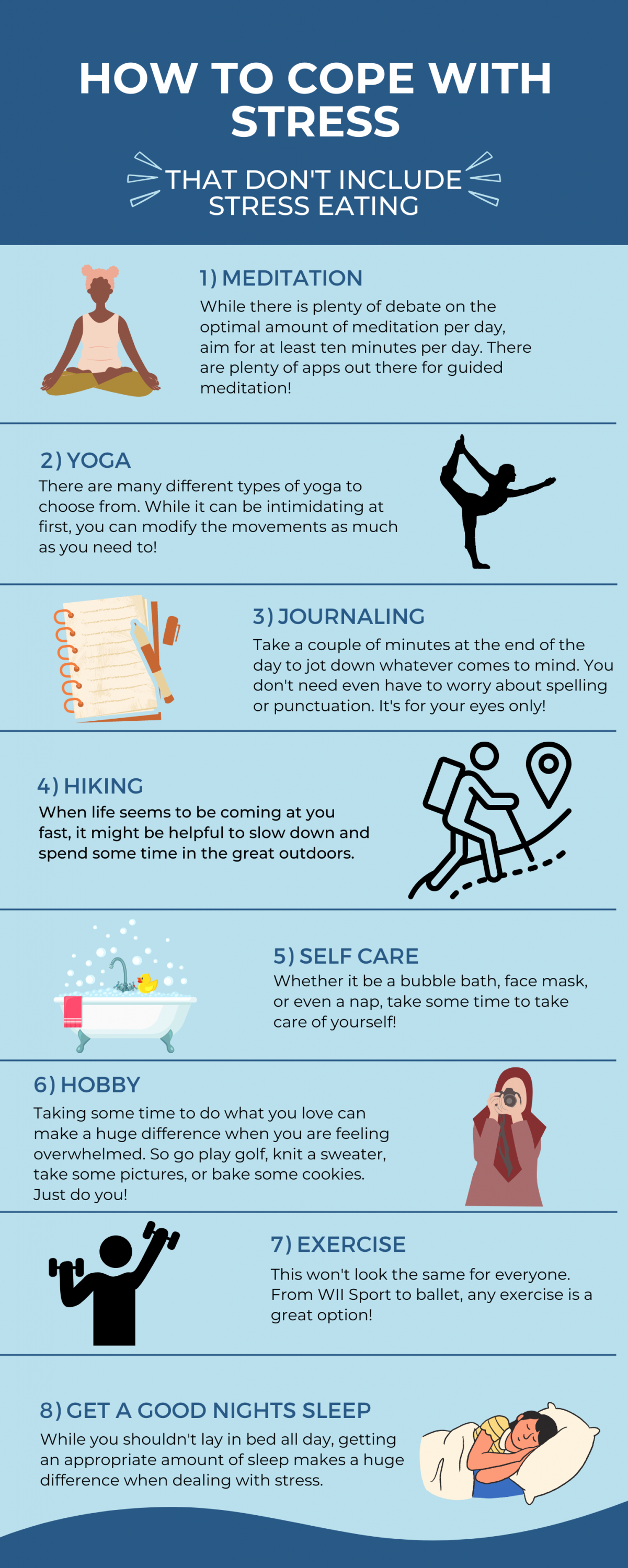
If you type “top New Year’s resolutions” into your search bar, you will find that multiple surveys are conducted yearly to answer that exact question. What do all of them have in common? Exercise more and eating healthier are almost ALWAYS in the top three. Unfortunately, improving dietary habits is a goal that many people struggle with. Stress eating is a common culprit that serves as a roadblock for many people trying to clean up their diet.
When stressed, a hormone called cortisol is released from the adrenal glands, which are located above our kidneys. You might have heard of the phrase “fight-or-flight” before. This refers to the body’s automatic response to stressful, frightening, or dangerous, stimuli. This fight or flight reaction is the body’s way of keeping you safe. Adrenaline is released to help keep you alert and cortisol aids in providing a quick energy source. Cortisol does this by stimulating our metabolism to break down carbs and fat. While this is vital for survival in life-or-death situations, it can also stimulate appetite. Chronic stress, therefore, leads to a chronically increased appetite, which often goes hand in hand with stress eating. This stress doesn’t need to be from running from a giant rock like Indiana Jones. It could be from working hard for a promotion, planning a wedding, having financial troubles, graduate school, or even anxiety. Unfortunately, our body is not able to differentiate good stress (having a baby, planning a wedding) from bad stress (running from a bear). It will handle all stress in the same way, which means that stress can be rather hard to avoid. Overcoming the stress-eating cycle is not about avoiding stress, but more about managing it.
The first step in breaking this cycle is to admit that there is one. Take time to think when eating, are you eating because you’re hungry or because of stress? It is important to be able to recognize when you are stress eating. During these times, consider what was happening before you went to the kitchen. While we may not always recognize the source of our stress, becoming a little more mindful in the moment can help equip you with the tools you need. Journaling may be helpful for some people to recognize and break patterns. The next step is to find a different coping method other than food.
If you are reading this article because you are a member of PUSH511, then you are already on the right track! The benefits of exercise are well established. However, it may sound a bit counterintuitive that exercise can help lower cortisol as the body considers exercise a stressor. When we exercise, the cortisol that is released acts on part of the brain to release dopamine. Dopamine has been nicknamed the “feel-good hormone” as it is released in response to happy stimuli like falling in love, winning the lottery, or taking part in your favorite hobby. Dopamine is vital for our ability to cope. The cortisol released during stimuli unrelated to exercise does not stimulate dopamine release. So although your workout does cause a temporary increase in cortisol levels it also helps you to cope with other stressors, making you a little less likely to head for that midnight bowl of ice cream. There are plenty of other ways to manage your stress. The graphic below contains some common methods, keep in mind there are many more options out there. Do what works for you. Above all, remember it is okay if you slip up sometimes. Be nice to yourself, you’re doing great!

To learn more how PUSH511 can help you, check out our Nutrition Services.
About the Author

I am a Licensed Registered Dietitian with experience in critical care, cardiology, weight loss, allergy services, and food service. I graduated from Penn State University with a BS in nutrition and finished my RD training at University of Maryland. I am currently in PA school and am looking forward to combining my love of nutrition with medicine. After moving to Baltimore in 2019, I did a trial class at PUSH511 Fitness as I was looking for accountability and to meet new people. When I walked into the gym for the first time, everyone was congregated on one side cheering on a member who was struggling with ring muscle-ups at the end of the workout. It was such an uplifting moment to witness. I left the gym that day in dire need of ginger ale, but also very excited about this amazing and supportive community I had stumbled upon. I am grateful for this opportunity to give back and share my love of nutrition!
Sources:
https://www.ncbi.nlm.nih.gov/pmc/articles/PMC6371989/
https://www.ncbi.nlm.nih.gov/pmc/articles/PMC5373497/
https://www.apa.org/topics/stress/body
https://www.medicalnewstoday.com/articles/320935#physical-vs-emotional-hunger
https://www.sciencedirect.com/science/article/pii/S0091302216300619?via%3Dihub


Comments are closed.